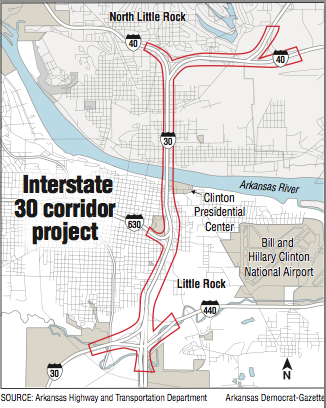A proposed construction project on the Interstate 30 corridor through downtown Little Rock and North Little Rock will include "major widening" and could require future construction on other parts of the area's interstates, according to a proposed amendment to central Arkansas' long-range transportation plan.
The Regional Planning Advisory Council, which is an arm of Metroplan, voted Wednesday to recommend to the full Metroplan board that the proposed amendment be sent out to solicit public comment next month. The board will take it up at its regular monthly meeting next week.
The Arkansas Highway and Transportation Department requested the amendment to Metroplan's long-range transportation plan to more accurately reflect the scope of the proposed work on the 6.7-mile corridor. The I-30 project's current language is "operational improvements and major reconstruction."
Metroplan, the region's long-range transportation planning agency, is required by federal highway officials to maintain a 25-year plan. The Federal Highway Administration also requires the region to gauge the impact of highway construction projects on other parts of the transportation system in central Arkansas.
Although the Highway Department considers the current I-30 project language adequate for the scope of the proposed work, adding "major widening" is an attempt to be fully transparent, said Ben Browning, design/build project director for the agency.
The staff for Metroplan also suggested that language be included in the plan that anticipates that improvements to some interstate corridors near the I-30 project will be needed because of the project.
Traffic modeling done by state highway officials indicates that congestion in the I-30 corridor, once the corridor work is done, would be shifted to parts of the interstate system leading into and out of the corridor, including I-30 from Interstate 530 to West 65th Street and Interstate 630.
State highway officials say studies assessing the project's impact on other parts of the system already are in the pipeline, and they point out that eliminating congestion in an urban environment as complex as the I-30 corridor isn't feasible nor is it a goal.
"None of the alternatives are going to eliminate congestion," Browning said. "The question is more how you manage congestion in urban areas."
Besides adding capacity, the project's aims are to improve the corridor's infrastructure -- the pavement and the Arkansas River Bridge need to be replaced -- and to make the corridor safer to navigate, he said.
The department acknowledges that other congestion issues might arise and will be addressed eventually, he said.
Scott Bennett, the director of the state Highway and Transportation Department, said studies looking at the project's impact on other parts of the system already are contemplated.
Members of the Regional Planning Council, which helps shape the long-range transportation plan, have largely been critical of the I-30 project, called 30 Crossing, and expressed reluctance Wednesday to support referring the proposed amendment to the public without first obtaining more information.
Approval of the amendment language is one of a handful of thresholds that must be reached before the project can go to construction.
The project centers on a series of improvements on the I-30 corridor from I-530 north to Interstate 40.
The project also includes a small section of I-40 in North Little Rock between John F. Kennedy Boulevard and U.S. 67/167 and replacement of the bridge over the Arkansas River.
State highway officials have identified $631.7 million in state and federal money that they can devote to the I-30 project.
The Metroplan board already has granted the project a waiver from the agency's regionwide policy that limits area freeways to six lanes. The Highway Department has envisioned widening the section to eight lanes or 10 lanes. In the latter scenario, the project would have six through lanes, which now exist, and four lanes devoted to local traffic crossing the Arkansas River.
Many on the advisory council have criticized the department's plans for the project. The council voted against recommending waiver approval to the full Metroplan board, but its decisions aren't binding.
Some advisory council members also wanted to delay approval of the amendment language until an environmental assessment on the project has been written. That assessment is expected to produce a preferred alternative, but it won't be ready until later this year.
Some council members also were reluctant to refer the proposed amendment to the public, fearing that their referral would be seen as an endorsement.
"I don't want the public to think I'm recommending this," said Amy Whitehead, a council member from Conway. "I think that needs to be clear."
But council member Becca Green, public engagement director for Pulaski County transit agency Rock Region Metro, urged the council to submit the amendment for public comment, saying "it signals to the public that there are other areas that will be impacted."
Metro on 04/20/2017
